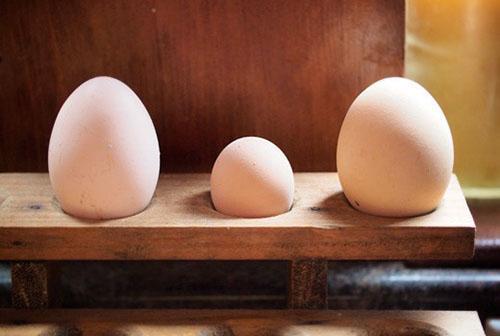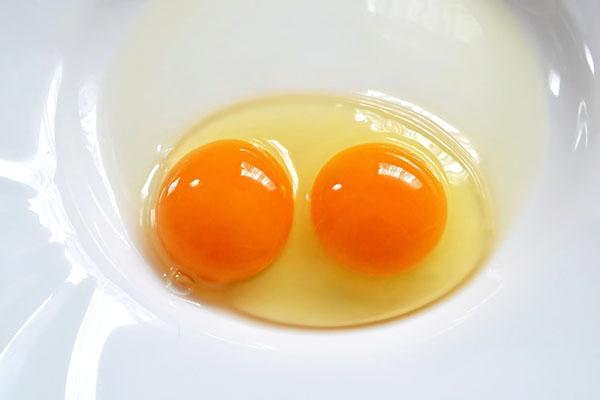Reasons for the appearance of unusual eggs in chickens
 Eggs in soft shells, small eggs without yolk, eggs with deformed shells or speckled. I am often asked questions (and all sorts of creepy photos are sent to my email address) about the reasons for the appearance of unusual eggs in chickens - with bumps, tubercles, with small specks, speckled, in a soft shell. In most cases, this is not a cause for concern.
Eggs in soft shells, small eggs without yolk, eggs with deformed shells or speckled. I am often asked questions (and all sorts of creepy photos are sent to my email address) about the reasons for the appearance of unusual eggs in chickens - with bumps, tubercles, with small specks, speckled, in a soft shell. In most cases, this is not a cause for concern.
Although it is often customary to judge the health of chickens by the appearance of eggs - healthy birds eat healthy balanced food and lay the same eggs of the usual regular shape, sometimes abnormal eggs that appear can be considered quite normal. It is worth worrying only if this happens all the time, since the reason may lie in serious health problems.
So I decided to describe some of the most typical and harmless types of abnormal chicken eggs.
Small eggs without yolk

Eggs with double yolk
 When two yolks are too close to each other in the oviduct, they sometimes become covered with the same protein (and shell) at the same time, resulting in a rather large egg. In general, a double yolk in an egg is not a cause for concern, so if your hen constantly lays such eggs, I would simply close my eyes to this if I were you. This does not pose any potential health hazard to chickens, in addition, double-yolk eggs are an excellent food product.
When two yolks are too close to each other in the oviduct, they sometimes become covered with the same protein (and shell) at the same time, resulting in a rather large egg. In general, a double yolk in an egg is not a cause for concern, so if your hen constantly lays such eggs, I would simply close my eyes to this if I were you. This does not pose any potential health hazard to chickens, in addition, double-yolk eggs are an excellent food product.
Speckled eggs
 As the egg moves through the oviduct, it turns. If the rotation is too fast, the egg may have a blurry pattern. If the egg moves slowly, then small blotches of pigment appear on it. Many chicken breeds (especially Welsumer) regularly lay speckled eggs. This is one of the most beautiful types of eggs, and they look great on the dining table.
As the egg moves through the oviduct, it turns. If the rotation is too fast, the egg may have a blurry pattern. If the egg moves slowly, then small blotches of pigment appear on it. Many chicken breeds (especially Welsumer) regularly lay speckled eggs. This is one of the most beautiful types of eggs, and they look great on the dining table.
Eggs with white deposits on the shell
 The fine white particles on the eggs are nothing more than calcium deposits. If there are different kinds of particles in the oviduct, from which the shell is formed, then calcium begins to be released to bind them. This leads to the formation of white deposits on the shell. They are well peeled off with a fingernail, after which the eggs can be eaten.
The fine white particles on the eggs are nothing more than calcium deposits. If there are different kinds of particles in the oviduct, from which the shell is formed, then calcium begins to be released to bind them. This leads to the formation of white deposits on the shell. They are well peeled off with a fingernail, after which the eggs can be eaten.
Eggs with wrinkled or ribbed shells
 The appearance of such eggs is quite common for more experienced hens... It can be caused by stress during egg laying due to loud barking of a dog, a lurking predator, thunderstorms and other irritants. Although from an aesthetic point of view, such eggs cannot be called beautiful, but they can be successfully eaten.
The appearance of such eggs is quite common for more experienced hens... It can be caused by stress during egg laying due to loud barking of a dog, a lurking predator, thunderstorms and other irritants. Although from an aesthetic point of view, such eggs cannot be called beautiful, but they can be successfully eaten.
Eggs in soft shell
 Typically, these eggs come from a lack of calcium in the diet, although there may be other reasons, for example, excess spinach in the feed.I would not risk eating these soft-shell eggs, as they lack the first line of defense against bacteria entering the egg - the shell.
Typically, these eggs come from a lack of calcium in the diet, although there may be other reasons, for example, excess spinach in the feed.I would not risk eating these soft-shell eggs, as they lack the first line of defense against bacteria entering the egg - the shell.
Eggs without shell
The only exception to the list of safe, unusual types of eggs may be eggs without shells. You may have heard of them. For seven years I have been breeding chickens, and have never encountered such a problem. But I know for sure that this is not a death sentence for a chicken, as you may have heard or read somewhere.
However, eating such eggs is dangerous.
In fact, they are not real eggs - they are soft, rubbery mass that the chicken sometimes lays towards the end of the cycle. According to many poultry experts, these so-called eggs are actually part of the reproductive system in which something is disturbed. As a result, they are excreted from the body through the oviduct.
As a rule, after the appearance of such eggs, the hens no longer lay.
Unusual eggs are usually a random occurrence, in which there is nothing to worry about. However, it's best to read some useful information ... just in case.